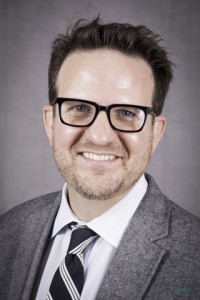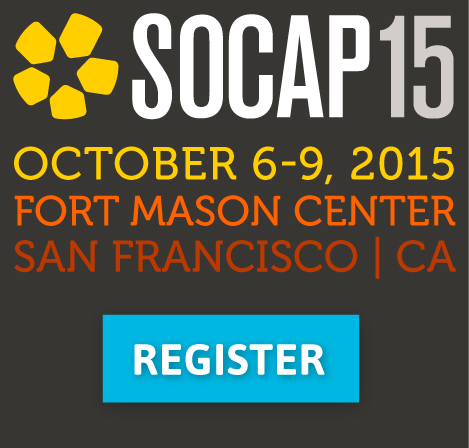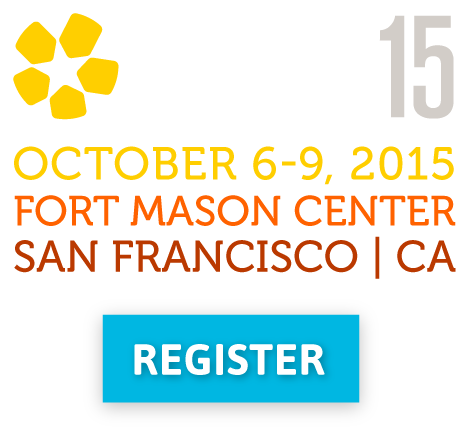 The Social Capital Markets Conference (SOCAP) Conference is the annual flagship event of MissionHUB, a network of co-working & events communities in San Francisco, Berkeley, New York, Philadelphia and Washington D.C. that are part of the global Impact Hub network. We recently sat down with Eryc Branham, the CEO of MissionHUB, to discuss the MissionHUB model and hear his projections for how co-working spaces will shape work and life in future decades.
The Social Capital Markets Conference (SOCAP) Conference is the annual flagship event of MissionHUB, a network of co-working & events communities in San Francisco, Berkeley, New York, Philadelphia and Washington D.C. that are part of the global Impact Hub network. We recently sat down with Eryc Branham, the CEO of MissionHUB, to discuss the MissionHUB model and hear his projections for how co-working spaces will shape work and life in future decades.
SOCAP: How did your view of living in the future play into your decision to join MissionHUB?
Eryc Branham: I’ve spent most of my career in the tech industry. In that time, I’ve focused on innovation and marketplaces – how technology is reinventing and reimagining things from fintech to healthtech to automobile technology. When I was with RocketSpace, a technology accelerator here in San Francisco, we were looking at how innovation expresses itself in different ways - specifically open innovation - and trying to discover the things that are really fueling innovation in these industries. To me, what was really exciting about MissionHUB was that those same elements in the tech world were very apparent in the social innovation universe.
I think that MissionHUB - both through SOCAP and our 5 Impact HUB campuses - serves the people who are defining the future of social innovation. We have seen individuals who are seeing problems in their local neighborhoods, deciding they have the means to create solutions, and becoe inspired to create a social enterprise. They’ve realized that it’s not some crazy moonshot to go out there and create an innovative solution, like Lava Mae’s mobile showers as a solution for the homeless population, who joined the Impact Hub San Francisco campus as a Google.org Impact Challenge winner. When you see that real markets are in place to support social entrepreneurs, then you realize that these individuals can build truly innovative solutions that scale and can be sustainable.
So for me, it was exciting to see all these little proof points happening within the MissionHUB ecosystem that we had previously seen in the technology sector. To see social entrepreneurs in the Hubs or at SOCAP, or impact investors, or VCs who are pursuing the idea that they can see an impact return, as well as an actual financial as well as impact return - I think that’s really interesting and important.
I also have three young kids and am trying to create a positive role model. I want for them to see the creation of change through action. Not a model of - you go and do your work thing and then as a hobby you create good. I’ve been serving on nonprofit boards for over ten years, but I cut my teeth in the social innovation space when I was at Salesforce.com, with the 1-1-1 model, that Marc Benioff advocated. That really sparked for me this idea that I didn’t have to separate work and philanthropic service to nonprofits, either at a board level or as a volunteer – that there could be a more integrated approach. I think we each have a responsibility to do this. The younger generations are getting more and more engaged, and see that engagement as an important part of their responsibility to society.
So, you’ve talked about some of the innovations in the spaces, and entrepreneurs in the spaces, how does the actual space itself reflect living in the future?
Well, we are living in a more mobile and entrepreneurial freelance society and there are both pros and cons to that. As a society, this is probably one of the great social changes that we are grappling with, this disintermediation of the corporation. As a society we’re currently struggling with some of the challenges of that. Look at the debates around UBER right now. Are UBER drivers employees? Or are they contractors? If UBER is a group of virtual contractors, what does that mean? What are the implications to society? We’re seeing a lot of conversations around insurance and health care. There’s a broader set of implications when we start to see the unitive measure not as the corporation, but the individual.
Impact Hubs, and co-working spaces in general, are serving individuals who need a place to work and the resources found in a traditional work environment, but are outside that traditional corporate model. I think we are in the very early days of what I call “office-as-a-service.” Co-working is just one element of an idea that is a full spectrum–the idea that there are these really flexible solutions, from a cafe down the street that you can plug into and work at, all the way up to large companies sharing offices spaces. In terms of the future of the office, and the future of the worker, we are at this really exciting place and I think there are several really interesting cultural implications of that.
Our Impact Hub co-working spaces offer solutions for mobile and freelancer populations. But co-working platforms are also becoming increasingly important and interesting to bigger companies. If you’re a social enterprise or a foundation or Google.org, you know there are a growing number of companies that want to be co-located together. There’s a value, not just a perceived value for the community, but also, there’s a value at the business level of being around like-minded individuals who are mission oriented, who are all trying to do good, and have resources that each can take on. Hopefully all boats float because of that. As we see places like Impact Hubs do this for social entrepreneurs and social innovators, we see proof that we can create these alternate modes of workplaces to serve a broader scope.
I grew up in Mount Shasta, a great little city in Northern California of about 3,500 people. There’s a really big problem with unemployment there in Siskiyou County. With this growing trend towards disintermediation of the corporation, I wonder, what if we had an entire society of people who could engage into work in new ways that didn’t have to be tied to physical location? What if the people of Mount Shasta who are looking for job opportunities had access to new and interesting ways of working virtually for entities that are looking for their expertise? What if they could develop expertise online? My desire is that this freelance, contractor culture will offer great hope to that little town and that this will create better opportunities for everyone.
And what is the upside for our co-working spaces of being affiliated with the SOCAP conference?
Well, the first thing is access to world class thought leadership and the people who are truly the innovators of the innovators. We offer access and a space where folks who are developing some of the most cutting edge ideas in social innovation can begin conversations. The biggest opportunity rests in bringing SOCAP conversations back into the Impact Hubs. SOCAP convenes the market at the intersection of money and meaning, and Impact Hubs are where change goes to work.
What we are trying to do at MissionHUB is to take these amazing ideas and conversations that spark and inspire people at SOCAP, and bring that into execution stage in Impact Hubs. If the brain is SOCAP, then the body that performs the action is an Impact Hub. We bring classes, and high quality SOCAP-level programming to the members of the Impact Hubs throughout the year. We aim to bring more of the SOCAP audience into Impact Hubs, so that they feel there is a constant connection to the themes and people they interact with at the conference.
How will that programming be customized to fit each Impact Hub location, and to help people address challenges in their community?
Local themes are one of the interesting things about the five Impact Hubs that we own and operate as part of MissionHUB. At each Hub we are asking - how can we create a focus area of programming that is developed to fit the city, or even the neighborhood that the Hub is in? If the region is grappling with some particular challenges, how can the Impact Hub be a catalyst for creating solutions?
For example, in New York the idea of a thematic focus on financial inclusion is something that makes a lot of sense. So the focus at Impact Hub New York City has been bringing members in who are working on financial inclusion challenges as well as impact investors who invest in financial inclusion companies, and corporate partners like Mastercard and American Express who are interested in developing and supporting a financial inclusion conversation. At SOCAP, financial inclusion is one of the cutting edge, thematic areas of focus. Having that thematic overlap between SOCAP and Impact Hub NYC allows us to create connections between the two. At SOCAP those mission aligned groups can have these inspiring world class conversations and then we can continue to support that by bringing those conversations into New York. We offer that in the other Hubs as well, whether the focus is sustainable food systems in Berkeley or sustainable cities in San Francisco or civic innovation in Washington, D.C.. Our ability to connect those focus areas with the conversations that are occurring in SOCAP is where we really build some magic.
And then, what about reaching people who aren’t in those cities or people who can’t come to SOCAP?
Ultimately, I believe we need to reach that potential social entrepreneur in Nebraska who doesn’t have access to an Impact Hub campus or the means to come to SOCAP. We need a platform that can reach that audience and bring the resources that we have in our Impact Hubs to them, whether that’s high quality programing content, or access to resources that are in that community and ecosystem. Obviously, technology and media are a ways that we can do that.
The crown jewel of our MissionHUB network is the content, programing, and media we can develop through events at our Impact Hubs, including interviews and success stories of our members, main stage content, and workshops that occur in the SOCAP ecosystem. We aim to eventually deliver that content to folks anywhere in the world via the Internet, and invite them to join the conversation.
When you look around today, what makes you feel like you are living in the future?
My son just turned 8 years old. The very first iPhone came out two days after he was born. The only way he has interacted with technology has been swiping on a touch screen. He never worked on a keyboard and has no interest in a keyboard. His generation has interacted with technology solely through gestures. At that same cultural level, I hope we are developing an entire generation today that doesn’t think twice about pursuing social innovation as just another professional career path on par with law, or medicine, or banking.
That thought that what we are building through the MissionHUB ecosystem is at the earliest point of a generational shift gives me great excitement. My hope is that 10 years from now, people will look back and compare our current model to their present day reality, as we compare the model T to the Tesla. Whole new areas of social innovation are being developed now; we are seeing little hints of it. That is the promise of what we are doing here.
Living in the Future will be one of the themes featured at SOCAP15. This track will explore current trends and their anticipated effects on life in the future so our community may work more effectively toward developing resilient, adaptable systems.
Eryc Branham is the CEO of MissionHUB. He previously served as the Chief Revenue Officer and GM of RocketSpace, a SF-based technology campus for high-growth startups and held executive positions at Salesforce.com, Oracle, and Moxie Software. Branham has founded and served as CEO of three startups including Opcentric (acquired by Acumen Solutions), TRE3 Group (acquired by Appirio), and Cogar Branham, an incubator focused on “innovation with integrity.”


